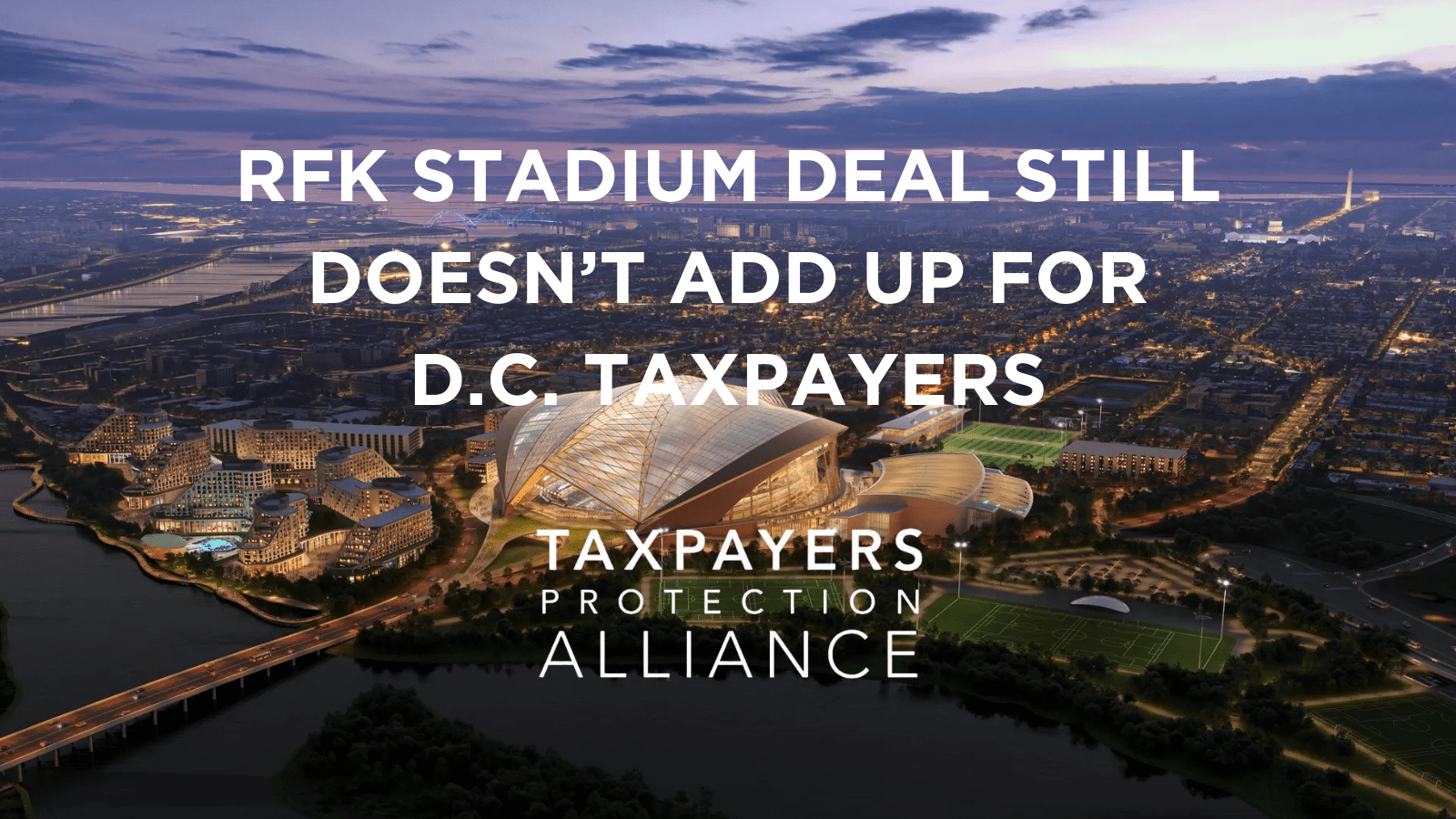
RFK Stadium Deal Doesn’t Add Up for D.C. Taxpayers
Mazie Goodlett
July 28, 2025
On July 14, under intense pressure from Mayor Muriel Bowser, the D.C. Council voted to pass the District’s revised fiscal year 2026 budget — including an estimated $1 billion placeholder for the proposed new Washington Commanders NFL stadium to be built on the site of Robert F. Kennedy Memorial Stadium. With the District in a budget crisis and projected to lose over $1 billion in revenue over the next three years, the last thing taxpayers need is to be put on the hook for extra spending — especially for a stadium deal that benefits a privately owned sports franchise.
Despite the council’s preliminary greenlight on next year’s budget, they avoided locking in the deal’s terms due to ongoing controversy. Instead, a separate measure to formalize the agreement is making its way toward public hearing on July 29. The Taxpayers Protection Alliance and hundreds of others, including citizens and watchdog groups, plan on participating in the hearing. The details of the plan may still be unfinalized, but the big picture is clear: subsidizing the Commanders on the taxpayer’s dime is wrong and unsustainable.
History tells us that municipal ventures to fund sports venues rarely live up to the hype. These projects don’t build up local economies the way that backers claim, and taxpayers are often left dealing with the fiscal consequences for years to come, with little to show for it.
For decades, economists have warned cities against throwing public money at stadium projects. Experts like John Siegfried and Andrew Zimbalist have been vocal about how these deals often fail to deliver on their promises. In fact, this is one of the few areas in economic research where nearly everyone agrees: new stadiums don’t lead to meaningful or lasting economic growth.
Cities across the country have learned the realities of stadium subsidies the hard way. The $470 million taxpayer-backed deal to keep the Cincinnati Bengals at Paycor Stadium is a perfect example of a much-hyped project gone awry. The city spent $540 million on the deal, but the promised economic growth never materialized; local services were subsequently cut to cover costs. The bid to replace the Buffalo Bills’ Highmark Stadium tells a similar story. And despite the surrounding hype, polling found 63 percent of voters in New York State opposed to the Bills’ stadium deal, with just 24 percent approving. Moreoever, for all the talk about revitalizing Buffalo, the stadium will be in the suburbs, not the city.
Stadiums can offer moments of community pride and entertainment, but those benefits come with major costs that taxpayers must shoulder for decades. At most, gains are concentrated in a few neighbourhoods. Consumers’ entertainment spending merely migrates from other parts of the city to the part in which new stadiums are built. Net economic activity doesn’t increase significantly; it merely is redistributed. Further, many neighbourhoods (e.g., the Bronx, which hosts Yankee Stadium) don’t benefit from having a stadium or ballpark in their backyard.
These stadium deals only succeed in locking taxpayers into funding decisions they ultimately have little voice in — not just for the present, but for the entire duration of the lease and any future extensions. Nonetheless, despite the overwhelming evidence, municipalities, much like D.C., continue to greenlight billion-dollar plans, and call them “investments,” even when the math historically doesn’t check out.
Unfortunately for D.C., the RFK Stadium deal isn’t the first time Mayor Bowser has oversold a redevelopment plan. In 2017, she pitched the Wharf as a major economic development opportunity, promising 6,000 permanent jobs and $94 million in yearly tax revenue. Fast forward to 2025, and the reported returns cannot compare to expectations. Sales tax revenue came in at about half the amount promised.
It’s a frustrating pattern: big, flashy announcements, high expectations, and a public left in the dust when the promises come up short. At a time when D.C.’s budget is already stretched thin, people deserve transparency, accountability, and fiscal responsibility.
To make matters worse, the financial report used to justify the RFK stadium deal is vague and overly optimistic — and written by a consulting firm with ties to the NFL. When the numbers are being pitched by people poised to benefit from the deal, residents cannot be expected to blindly trust the projections.
The bottom line is that if billionaires want a stadium, they can afford to pay for it themselves. D.C. residents shouldn’t be stuck with a $1 billion tab (at least) for the kind of project that history has proven, time and time again, to be a bad investment.
